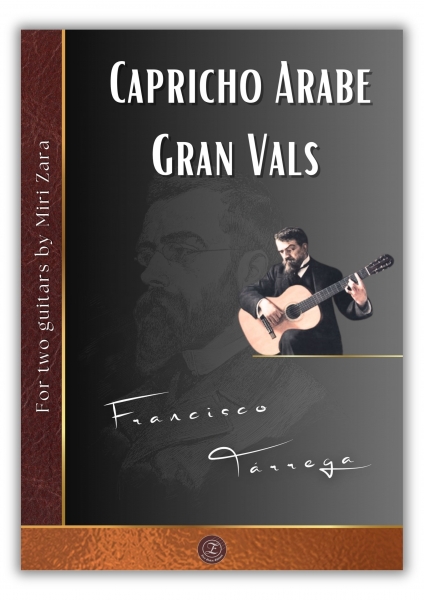

Collection - Tárrega for two
| Type of Music Notation: | Standard |
| Format: | |
| Number of pages or Backing tracks: | 37 |
Browse all pages in unique Flip-book preview
Collection Tárrega for two
- Capricho Árabe
- Gran Vals
Capricho Árabe
Capricho Arabe is the most popular work of the iconic Spanish guitarist Francisco Tárrega (21 November 1852 – 15 December 1909) who initiated the revival of interest in the classical guitar that had fallen out of fashion during the Romantic period. He traveled extensively throughout the country, exploring the folk traditions of different regions in order to create new aesthetics for the guitar music that remains relevant to this day. He is often called "the father of classical guitar" and is considered one of the greatest guitarists of all time.
Tárrega wrote his Capricho Arabe in 1888 while staying in Valencia where Muslim, Castilian, and Christian cultures historically mixed. The following year, the piece was printed in Barcelona becoming his first published composition.
After the fast introduction designed to evoke associations with the Maqam melodic system, Capricho Arabe compositionally revolves around a single theme that softly develops in the key of D minor and then varies by turning to D major. This rather unusual modulation helps to create a distinctive contrast within the same work without making serious alterations to the performing style. At the end of the piece, the melodic passages return to their original forms and help re-establish the minor key.
Capricho Arabe, marked by the composer in the manuscript as a serenata, is dedicated to his fellow countryman Tomás Bretón whose contribution to the establishment of Spanish folk traditions in classical music was considered by Tárrega to be vital. There is a correspondence between the two composers where Bretón gives compliments to Tárrega, offering assistance in the publication of his first composition.
Significantly, it was Capricho Arabe that was performed by several groups of musicians during Tárrega's funeral ceremony in 1909.
Gran Vals
As the second composition, I chose Gran Vals, which is like a kind of counterpoint to Capricho Árabe. It was written by Tárrega in 1902 and expresses playfulness, comfort and grandeur. Much later, an excerpt of this work became famous as the "Nokia tune", the default ringtone of Nokia phones.


.jpeg)


